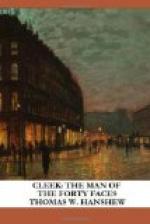He could only explain about the letter that used to come off and on in the other days and which brought such a flow of high spirits to the man for whom it was intended; he could only say that it was addressed in a woman’s hand and bore always the one postmark; and when Narkom heard what that postmark was and recollected where Lady Chepstow’s country seat lay, and who was with her, he puckered up his lips as if he were about to whistle and made two slim arches with his uplifted eyebrows.
“Sir, if only you could sneak off and run down there without his knowing of it—it wouldn’t do to write a letter, Mr. Narkom: he’d be on to that before you could turn round, sir,” the boy ventured hopefully; “but if only you could run down there and give her a tip what she’s a doing of and what she’s a chuckin’ away, what a Man she’s a throwin’ down, maybe, sir, maybe—”
“Yes, ‘maybe,’” agreed the superintendent, after a moment’s reflection. “At any rate it’s worth a trial.” And went, forthwith.
Not that it was a prudent thing to do; not that it is wise for any man at any time to interfere, even with the best intentions, with the course of another man’s love affairs; and, finally, not that it was at all necessary or had any influence whatsoever upon the events which succeeded the step. Indeed, he might have spared himself the trouble, for he had barely covered a fifth of the distance when the country post was delivered in London, and Cleek, rocketing up in one sweep from the Pit to the Gateway, stood laughing huskily with a letter from Ailsa in his hand.
He ripped off the envelope and read it greedily.
“Dear Friend,” she wrote, “I cannot imagine what you must think of my silence; but whatsoever you do think cannot be half so terrible as the actual cause of it. I have been in close touch with misery and death, with things so appalling that heart and mind have had room to hold nothing else. Indeed, I am still so horribly nervous and upset that I scarcely know how to think coherently much less write. I can only remember that you once said that if ever I needed your help I was to ask; and oh, Mr. Cleek, I need it very very much indeed now. Not for myself—let me find time to add that—but for a dear, dear friend—the friend I have so often written about: Captain Morford—who is involved in an affair of the most distressing and mysterious character and whose only hope lies, I feel, in you. Will you come to the rescue, for my sake? That is what I am asking. Let me say, however, that there is no possibility of a reward, for the captain is in no position to offer one; but I seem to feel that that will not weigh with you. Neither can I ask you to call at the house, for, as I have already told you, Lady Chepstow does not care for the Captain and under those circumstances it would be embarrassing to ask him there to meet you. So then, if no other case intervenes, and you really can grant me this great favour, will you be in the neighbourhood of the lich-gate of Lyntonhurst Old Church at nine o’clock in the morning of Thursday, you will win the everlasting gratitude of, Your sincere friend—AILSA LORNE.”




